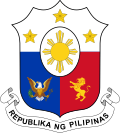| 10th Congress of the Philippines | |||||
|---|---|---|---|---|---|
| |||||
 | |||||
| Overview | |||||
| Term | July 24, 1995 – June 5, 1998 | ||||
| President | Fidel Ramos | ||||
| Vice President | Joseph Estrada | ||||
| Senate | |||||
| Members | 24 | ||||
| President |
| ||||
| President pro tempore |
| ||||
| Majority leader |
| ||||
| Minority leader |
| ||||
| House of Representatives | |||||
| Members | 226 | ||||
| Speaker | Jose de Venecia Jr. | ||||
| Deputy Speakers | |||||
| Majority leader | Rodolfo Albano Jr. | ||||
| Minority leader | Ronaldo Zamora | ||||
 |
|---|
The 10th Congress of the Philippines (Filipino : Ikasampung Kongreso ng Pilipinas), composed of the Philippine Senate and House of Representatives, met from July 24, 1995, until June 5, 1998, during the last three years of Fidel Ramos's presidency. The convening of the 10th Congress followed the 1995 national elections, which replaced half of the Senate membership, and the entire membership of the House of Representatives.






